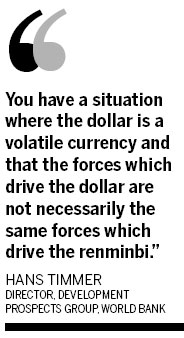Top Biz News
World Bank official says no case for revaluation
By Andrew Moody and Ding Qingfen (China Daily)
Updated: 2010-03-31 09:47
 |
Large Medium Small |
Forecaster says change in the yuan's value would not solve US problems
BEIJING: A leading figure from the World Bank has rejected US government claims that the Chinese yuan is undervalued.
Hans Timmer, who has a high-profile role as director of the bank's Development Prospects Group, said US economic problems would not be solved by a change in the value of the yuan.
| ||||
Timmer's remarks will not be welcomed by the Obama administration, which has been pressing Beijing to revalue the yuan against the dollar so as to equalize the trade imbalances between the two countries.
The economist, who is responsible for international economic forecasts for the Washington-based organization, added that if there was a problem between the yuan and the dollar it was that the greenback had become an unstable currency.

"You have a situation where the dollar is a volatile currency and that the forces which drive the dollar are not necessarily the same forces which drive the renminbi. The current system does not make a lot of sense for the Chinese economy."
Timmer made his comments as a number of China's leading academics called upon the Chinese government to stand firm in the face of US pressure to revalue the yuan.
Chen Yulu, vice-president of Renmin University of China, speaking at a forum in Beijing to discuss the country's foreign exchange rate, said it was "stupid" for US senators to demand a revaluation.
"The Chinese currency is not undervalued and foreign exchange policy cannot exert much impact on the trade imbalance, " he said.
"A yuan appreciation, if it happened soon, would destroy Chinese exports, push up property prices and accelerate the inflow of hot money into China."
Li Daokui, a senior professor of Tsinghua University and a member of the People's Bank of China monetary policy committee, said the US was creating a "political farce".
"China must hold firm in this battle and cannot give a nod to any appreciation in a short term," he said.
He added there were dangers in China making any sort of significant concession.
"The US would take it for granted that China would do whatever it was asked to do and there would then be more demands in the future."
Liu Wei, president of Peking University's school of economics, told the forum revaluing the currency now would damage attempts to stimulate the Chinese economy.
"China's current urgent task is to stimulate the economy and encourage economic development, which does not allow us to make a decision about currency revaluation in the short term," he said.
Timmer from the World Bank urged the Chinese government to consider pegging the yuan to a basket of major currencies, rather than the dollar. It has been set at around at about 6.83 per dollar since July 2008.
"It would create more stability if the yuan was set against a weighted average of other currencies so the Chinese currency is not always following the dollar all the time," he said.
Timmer said that although he was not worried about inflation in China, he believed the current boom in property prices was much more unpredictable.
He said the 35 percent increase in the credit supply as a result of the stimulus package had helped fuel ever-higher house prices, particularly in major cities.
"In the real economy when you have inflation there is normally an equilibrium mechanism, which often means people spend less," he said.













